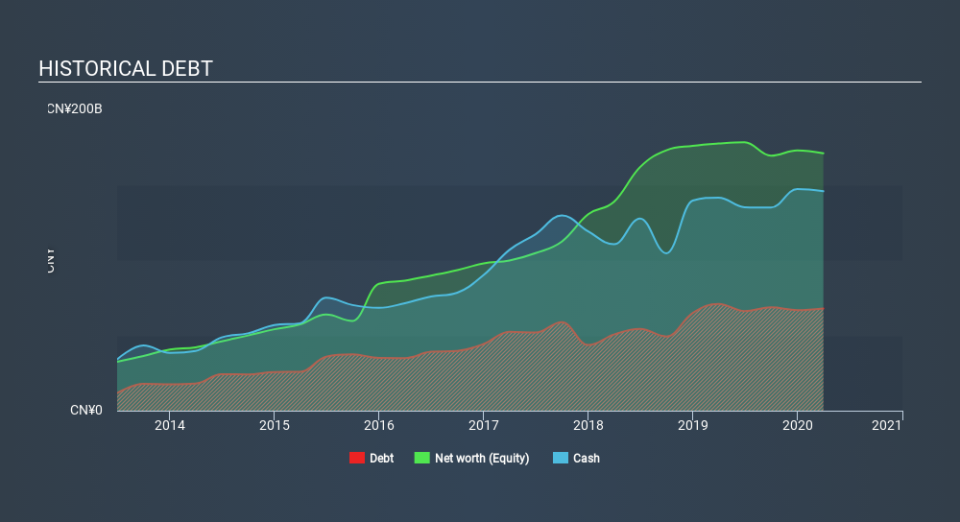Baidu (NASDAQ:BIDU) Seems To Use Debt Quite Sensibly

Howard Marks put it nicely when he said that, rather than worrying about share price volatility, 'The possibility of permanent loss is the risk I worry about... and every practical investor I know worries about. So it might be obvious that you need to consider debt, when you think about how risky any given stock is, because too much debt can sink a company. We note that Baidu, Inc. (NASDAQ:BIDU) does have debt on its balance sheet. But the real question is whether this debt is making the company risky.
What Risk Does Debt Bring?
Debt is a tool to help businesses grow, but if a business is incapable of paying off its lenders, then it exists at their mercy. If things get really bad, the lenders can take control of the business. However, a more usual (but still expensive) situation is where a company must dilute shareholders at a cheap share price simply to get debt under control. Having said that, the most common situation is where a company manages its debt reasonably well - and to its own advantage. The first step when considering a company's debt levels is to consider its cash and debt together.
See our latest analysis for Baidu
How Much Debt Does Baidu Carry?
As you can see below, Baidu had CN¥67.9b of debt at March 2020, down from CN¥70.9b a year prior. However, its balance sheet shows it holds CN¥145.7b in cash, so it actually has CN¥77.8b net cash.
A Look At Baidu's Liabilities
Zooming in on the latest balance sheet data, we can see that Baidu had liabilities of CN¥56.0b due within 12 months and liabilities of CN¥72.2b due beyond that. Offsetting this, it had CN¥145.7b in cash and CN¥9.69b in receivables that were due within 12 months. So it can boast CN¥27.2b more liquid assets than total liabilities.
This short term liquidity is a sign that Baidu could probably pay off its debt with ease, as its balance sheet is far from stretched. Simply put, the fact that Baidu has more cash than debt is arguably a good indication that it can manage its debt safely.
It is just as well that Baidu's load is not too heavy, because its EBIT was down 41% over the last year. When a company sees its earnings tank, it can sometimes find its relationships with its lenders turn sour. There's no doubt that we learn most about debt from the balance sheet. But ultimately the future profitability of the business will decide if Baidu can strengthen its balance sheet over time. So if you're focused on the future you can check out this free report showing analyst profit forecasts.
Finally, a company can only pay off debt with cold hard cash, not accounting profits. Baidu may have net cash on the balance sheet, but it is still interesting to look at how well the business converts its earnings before interest and tax (EBIT) to free cash flow, because that will influence both its need for, and its capacity to manage debt. Happily for any shareholders, Baidu actually produced more free cash flow than EBIT over the last three years. That sort of strong cash conversion gets us as excited as the crowd when the beat drops at a Daft Punk concert.
Summing up
While it is always sensible to investigate a company's debt, in this case Baidu has CN¥77.8b in net cash and a decent-looking balance sheet. And it impressed us with free cash flow of CN¥12b, being 115% of its EBIT. So we don't have any problem with Baidu's use of debt. When analysing debt levels, the balance sheet is the obvious place to start. However, not all investment risk resides within the balance sheet - far from it. Take risks, for example - Baidu has 3 warning signs we think you should be aware of.
When all is said and done, sometimes its easier to focus on companies that don't even need debt. Readers can access a list of growth stocks with zero net debt 100% free, right now.
Love or hate this article? Concerned about the content? Get in touch with us directly. Alternatively, email editorial-team@simplywallst.com.
This article by Simply Wall St is general in nature. It does not constitute a recommendation to buy or sell any stock, and does not take account of your objectives, or your financial situation. We aim to bring you long-term focused analysis driven by fundamental data. Note that our analysis may not factor in the latest price-sensitive company announcements or qualitative material. Simply Wall St has no position in any stocks mentioned. Thank you for reading.

 Yahoo Finance
Yahoo Finance 
